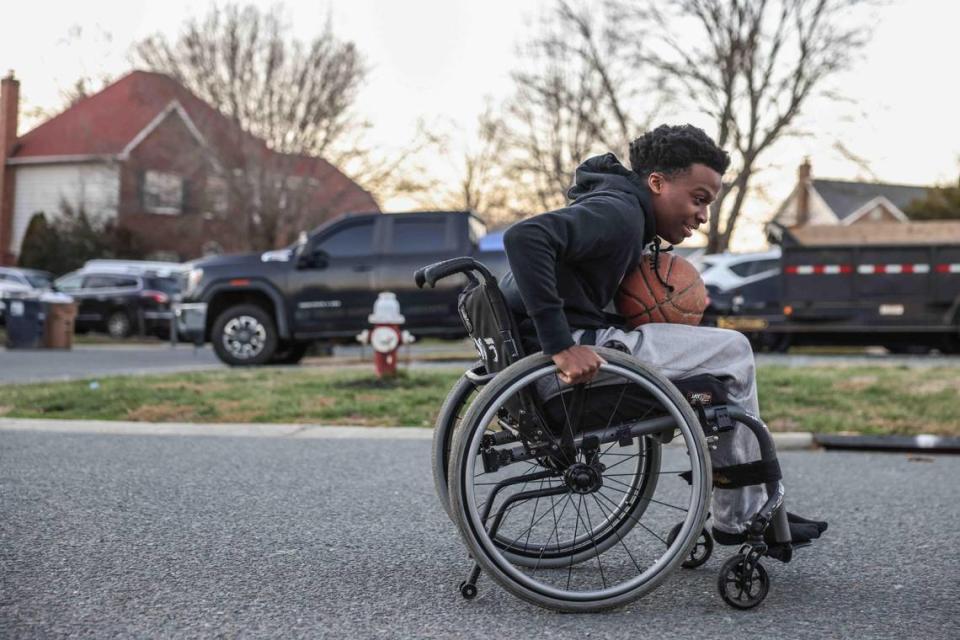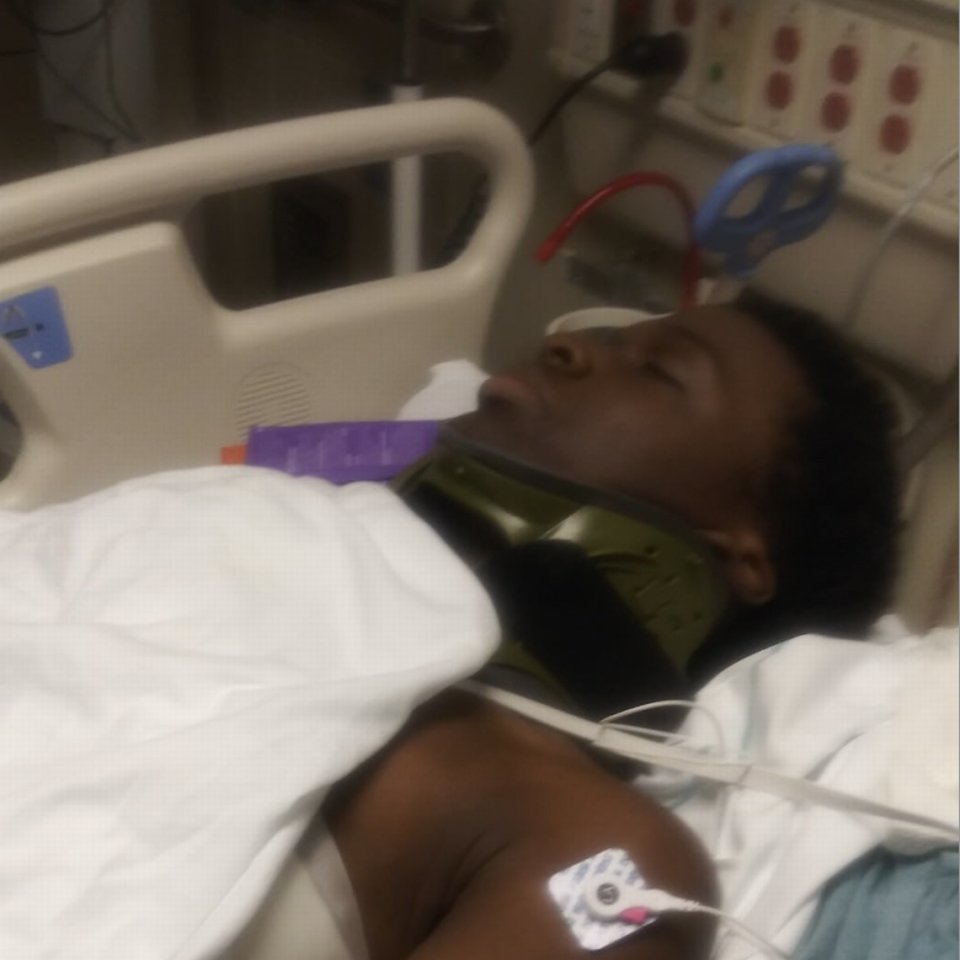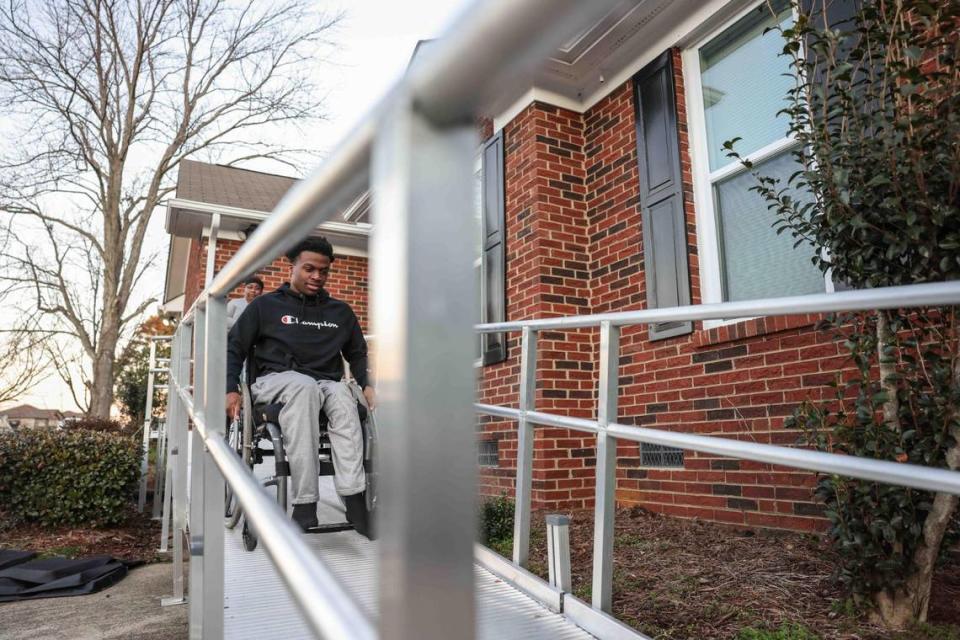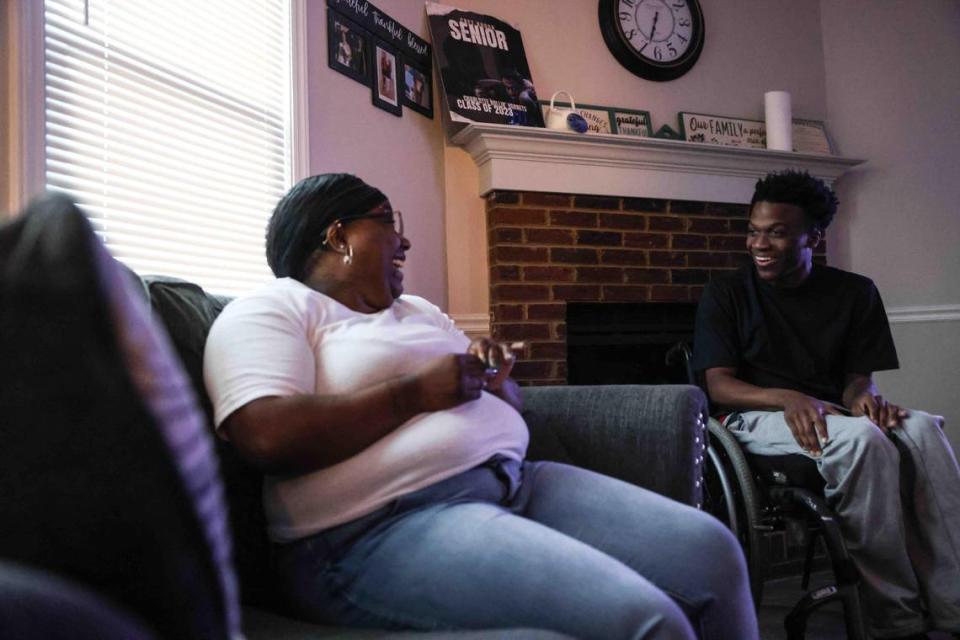At 15, gunfire paralyzed him and killed his cousin. Now 18, it all still makes him sick.
EDITOR’S NOTE: This reporting is part of ongoing Charlotte Observer coverage about gun violence, its impact on families and communities and relevant public policy.
More than three years after a gunman fired one bullet into Chrishaun Hough’s back that paralyzed him when he was 15, and then shot another bullet that killed his 16-year-old cousin, the whole thing still makes Chrishaun sick.
Not just figuratively; literally.
On the most recent anniversary of the Jan. 20, 2020 ambush-style shooting in Wadesboro that devastated the families of the two teenage victims, Chrishaun’s mother, Loretta Gaddy, had scheduled interviews for herself and her son with Charlotte reporters to reflect on the tragedy and their lives since.
At the last minute, however, she had to cancel. Because — as he has on or around previous anniversaries — Chrishaun took physically ill, suffering through fits of vomiting, bouts of light-headedness, and trouble simply just getting himself out of bed.
He has no explanation, other than grief. After all, Malik Byrd was more than just a cousin to Chrishaun. He was, in fact, like a brother.
Although the two lived 35 minutes apart (Malik in Wadesboro and Chrishaun in Monroe), they got together in person or online as often as they could, bonding over their shared passion for WWE’s brand of professional wrestling and video games like “Call of Duty.”
They would not, however, have been together in that car on that ill-fated day under typical circumstances.
For one, Chrishaun had just been suspended from school for the first time ever, he says, for getting into a fight with another student over a girl he liked. Then, the night before the incident, Loretta says, Malik’s older brother had come to her house with friends after feuding with another group of young men, and that soon after, someone fired multiple shots into her home. One of Malik’s older brother’s friends was struck in the leg and hospitalized.
Loretta says they’d never before had a problem like that in their neighborhood.
So the combination of Chrishaun not being allowed at school and the unexpected unrest at home is what prompted Loretta to send him and his younger sister, then 12, off to stay with extended family in Wadesboro on Monday, Jan. 20.
The trouble there started in the afternoon: Chrishaun, his younger sister, Malik and Malik’s younger sister piled into a car with Malik’s stepfather and Malik’s older brother (the one who’d tried to hide out in Loretta’s house the night before) and headed to Harvest Ministries Outreach Center in Wadesboro, a popular place for pickup basketball games.
But Loretta says someone from the same group that had fired bullets into her house the night before was at the center, too, that more words were exchanged, and that when the car full of her family members left, it was followed.

‘From feeling something to feeling nothing’
From the courts, the six made a pit stop at the home of a woman whom Malik’s older brother had recently had a baby with. Upon arrival, Malik’s older brother went into the house to get his baby, leaving the other five to wait. Malik got out but was near the car. The other three youths — including Chrishaun, who had fallen asleep — were in the backseat.
Chrishaun says he awoke to the sound of someone repeatedly yelling “Get down!” An instant later, gunfire erupted. Malik was struck multiple times. Chrishaun, who says he reflexively tried to shield his younger sister, was hit once, squarely in the spine.
“I didn’t feel no pain,” Chrishaun recalls. “I was trying to push up, but I couldn’t get up. Instantly from feeling something to feeling nothing. It felt like I was floating.”
He doesn’t remember much else until he came to in an ICU bed at Levine Children’s Hospital.
With family members standing over him, he looked around and asked, “Where Malik at?” When one of them responded that his cousin hadn’t survived, Chrishaun let out a primal scream, then began sobbing uncontrollably.
But there was more bad news. That “floating” feeling was still there, and a few minutes later, a doctor explained to him why: Chrishaun had suffered a spinal cord injury, one that had rendered his body completely functionless below the entry point of his wound.
“It was a lot for one moment,” Chrishaun says. “I couldn’t really process everything.”
He spent the whole night crying, although none of those tears were for himself. They were all for Malik. In fact, throughout most of his time in the hospital Chrishaun says he barely even cared that he’d lost the use of his legs. He was mainly consumed by anguish over losing his cousin.
One of his lowest points, aside from the moment he first was told of Malik’s death, came about a week later.
By that point, he had made enough improvements to move from the ICU to a regular room. He hoped that meant he would be well enough to leave the hospital to attend Malik’s funeral, even if it meant he’d have to attend with a chest tube and that he’d need to assume some risk by being around a large crowd of people and, potentially, infection-causing bacteria getting into the tube’s insertion site.
But it seemed like he’d get the OK. So, when his doctors ultimately told him no — that he needed to stay in his bed — Chrishaun burst into tears. “Please don’t be telling me I can’t go!” he wailed.
“His body went into shock,” his mother Loretta says, “and he took sick bad.” She says he started throwing up blood, and couldn’t keep food down. It was a shocking and devastating setback: Later the same day, he was returned to intensive care, where he remained for two more weeks.

Picking up the pieces after the tragedy
Chrishaun was still being treated in the ICU on a part-time basis when he started physical therapy.
In the earliest stages, his PT was focused on teaching him to sit up, to balance himself by using his hands, and to use a sliding board to transfer himself between his wheelchair and his bed. These exercises were made more difficult because he still had the chest tube installed to drain fluid from his lungs, and was still periodically throwing up blood. He also was in both a neck brace and a body brace. It was a tedious but also arduous routine.
When he finally went home, he was still wearing the body brace; and into the spring and summer of 2020, Chrishaun had residual medical issues that periodically were serious enough to put him back in the hospital, for one week here, another two weeks there.
Chrishaun also was finally starting to grieve the loss of the use of his legs and wrestle with “Why me?”-type thoughts. When he wasn’t making a return visit to the hospital, he says, “First couple months, I really didn’t even leave my house, honestly. I would just stay inside, just stay in my room.”
Yet over time, he began emerging from his shell. Began trying to push himself out of his comfort zone. To better himself, in a variety of ways:
Roughly four months after he was paralyzed, he started volunteering at Levine Children’s Hospital, counseling other young victims of gun violence virtually.
In September 2020, just eight months post-injury, he joined the Charlotte Rollin’ Hornets wheelchair basketball program. Last spring, his high-school-age team won a varsity national championship; and the program’s director, Mike Godsey, says Chrishaun is “a great ambassador for our program” who “always has a smile on his face.”
Since October, Chrishaun has also been working as a host at his favorite restaurant — Buffalo Wild Wings in Monroe — and he’s apparently doing well: In January, a customer posted a photo of himself with Chrishaun on Facebook, along with a caption that gushed about the teen’s hustle and work ethic. It wound up being shared nearly 750 times.
And after he graduates from Porter Ridge High School in Indian Trail this spring, he’ll begin attending Wingate University in Union County in the fall on a four-year scholarship awarded to him by Wingate’s Wayfind Program, which identifies promising first-generation college students of color as middle-schoolers and helps prep them for higher education. He plans to pursue a career in sports broadcasting.
“I mean, you just gotta know how to reset,” Chrishaun says, asked about how he’s tried to approach life since the shooting. When he was struggling with his “Why-me?” feelings, “I was like, ‘Wow, I used to walk. I can’t do this, I can’t do that no more.’ Now I don’t think of it like ‘I can’t walk no more.’ I just live my days and ... I just keep going, bro. I just gotta keep moving forward, finding new things to do — new ways to live — and helping others.
“I want to do my part, for others. For Malik. My way of using my second chance for good.”
But there’s no sugarcoating this: Three years after being shot and paralyzed, life remains full of challenges.

‘I get along fine on a wheelchair’
Purely in terms of his ability to get around, Chrishaun tends to exude indifference.
“I really don’t care about, like, the whole walking thing,” he says. “I get along fine on a wheelchair.”
And he does indeed make it look easy: When he heads out to shoot around at the basketball goal on the street in front of his house, he quickly navigates his way between the cars packed tightly into his family’s driveway without dinging any doors, as if he’s done this a thousand times — which, at this point, he has.
He mentions that he continues to do physical therapy twice a week at home, although these days the focus is on far-more-advanced workouts than he did in the hospital. On cardio, generally. Often on basketball drills, specifically.
At the same time, Chrishaun also talks longingly about being a fast runner before the shooting; about wishing he could still run; about how, had he known this was going to happen to him, he would have put down the video-game controller and gone out for the basketball team. Or the track team. Or anything that would have relied on him using his legs to excel.
He talks about how, early on, the wheelchair made him feel inferior to others, and that while he’s since mostly gotten over that feeling, he still struggles with confidence in social situations — particularly when trying to talk to girls he’s interested in.
Asked about what bothers him most about being paralyzed, he hesitates, then hesitates again, before saying what frankly would likely top the lists of many 18-year-olds in his situation: not being able to have sex.
There are other ongoing problems. He is prone to urinary tract infections because he uses a catheter, and he says he has struggled with PTSD — with “thinking bad thoughts, like somebody gonna come shoot me or something,” Chrishaun says. “I don’t really like being in parked cars. I don’t like stopping or nothing, especially at red lights. ... I don’t like being near windows, and say somebody dropped something really loud, that would scare the life out of me.”
There’s one thing, however, that he doesn’t harbor: anger.
His mom did, for a while. “At first when it happened, I had the mind of, yeah, let me go get some get-back. You gonna hurt my child, you need to be got. I ain’t gonna even lie. I was mad as hell. Lot of anger, for months. And I had to just pray about it.” Eventually, Loretta says she decided that “God gonna handle it. Karma do come around. ... It ain’t even worth it. Me taking his life, that ain’t gonna do nothing for my kids.”
But Chrishaun says he’s never had vengeance in his heart.
He just wants to move on. To go to Wingate. To become a sports broadcaster, to make money — enough to buy a car with hand controls so he can be more independent. To be, as he says, “just cooling it for the rest of my life. Like, I don’t really want no drama.”
And maybe, just maybe, to reach a point where he can get through the anniversary of his cousin’s death without getting sick.

-
Two quick postscripts:
More than three years later, still no arrests have been made in the shooting that killed Malik Byrd and paralyzed Chrishaun Hough. Anyone with tips about the crime can call 704-694-2167 or 919-662-4500. North Carolina is offering a reward of up to $5,000 for information leading to an arrest and conviction.
In January, Loretta Gaddy started a GoFundMe aimed toward raising money to help her son — who recently got his driver’s license — get that hand-control-equipped vehicle.

